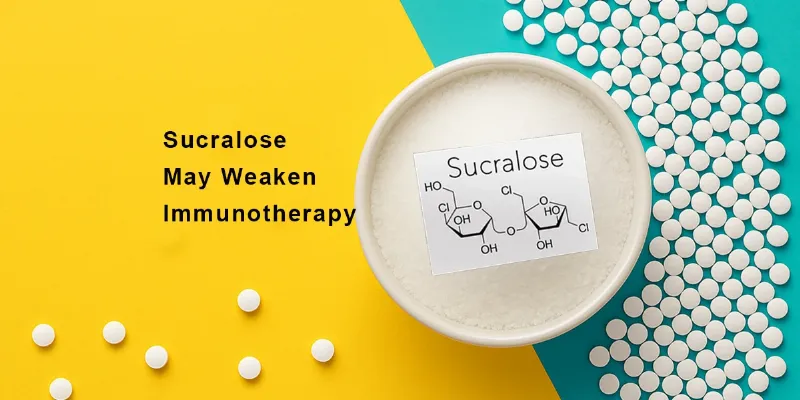Artificial Sweetener Sucralose May Undermine Cancer Immunotherapy, Study Finds

31 July 2025
The popular artificial sweetener sucralose may impair cancer immunotherapy by depleting arginine—an amino acid essential for T cell function—according to a new study published in Cancer Discovery. Sucralose reduced the efficacy of anti-PD-1 immunotherapy; however, supplementation with arginine or citrulline successfully restored immune function. Among 132 melanoma and NSCLC patients, high sucralose intake correlated with poorer outcomes.
The study is raising red flags about the use of sucralose—one of the world’s most common artificial sweeteners—among patients undergoing cancer immunotherapy. The research, led by scientists from the University of Pittsburgh and UPMC Hillman Cancer Center, suggests that sucralose may impair immune responses and compromise treatment efficacy in patients with advanced melanoma and non-small cell lung cancer.
Although sucralose is widely marketed as a calorie-free sugar substitute for individuals managing diabetes or weight, its effects on immune function have remained largely unknown—until now.
A Microbiome-Immunity Link
The research team, co-led by Dr. Abby Overacre and Dr. Diwakar Davar, uncovered a previously unrecognized mechanism by which sucralose may hinder immunotherapy. Using both mouse models and clinical data from cancer patients, they showed that high intake of sucralose alters the gut microbiome in a way that suppresses T cell function—ultimately reducing the effectiveness of immune checkpoint inhibitors such as anti-PD-1 therapy.
“When arginine levels were depleted due to sucralose-driven shifts in the microbiome, T cells couldn’t function properly. As a result, immunotherapy wasn’t as effective in mice that were fed sucralose,” said lead author Dr. Overacre, Assistant Professor of Immunology at Pitt and UPMC Hillman.
In preclinical models of melanoma and lung adenocarcinoma, mice consuming sucralose exhibited significantly larger tumor volumes, impaired T cell responses, and lower survival rates compared to controls. Importantly, supplementation with either arginine or citrulline—the latter of which is metabolized into arginine—restored T cell function and rescued treatment response.
Clinical Implications in Human Patients
To evaluate the clinical relevance of these findings, the team analyzed dietary data from 132 patients with advanced melanoma or NSCLC undergoing anti-PD-1 therapy. Patients who reported high sucralose intake—such as from diet sodas or artificially sweetened beverages—had significantly worse treatment responses and overall survival, even when adjusting for cancer type, stage, and treatment regimen.
“We found that sucralose impeded the effectiveness of immunotherapies across a range of cancer types, stages and treatment modalities,” said Dr. Davar, Associate Professor of Medicine at Pitt and oncologist at UPMC Hillman. “These observations raise the possibility of designing prebiotics, such as targeted nutrient supplementation for patients who consume high levels of sucralose.”
A Potentially Reversible Effect
What makes this discovery particularly compelling is that the detrimental effect of sucralose appears modifiable. In preclinical models, restoring arginine levels—either through direct supplementation or fecal microbiota transfer from immunotherapy responders—reinstated anti-tumor immunity.
This opens the door to a pragmatic solution: nutrient-based interventions that may counterbalance the negative immunologic effects of sucralose without asking patients to eliminate it from their diets entirely.
The researchers plan to launch a clinical trial to evaluate whether citrulline supplementation can enhance immunotherapy response in patients with high sucralose intake. They are also expanding their investigation to include other common sweeteners such as aspartame, saccharin, xylitol, and stevia. For oncologists and healthcare providers, the findings offer a timely reminder that diet—particularly the use of artificial sweeteners—can be a critical, yet underappreciated, variable in cancer care.











Comments
No Comments Yet!